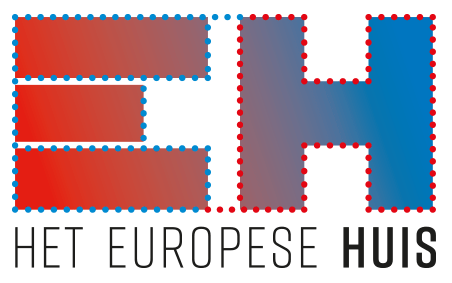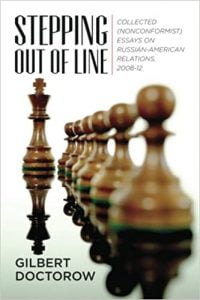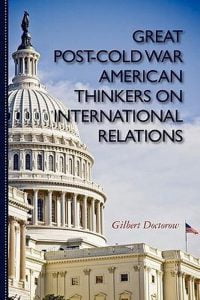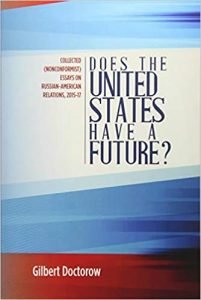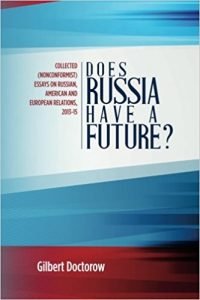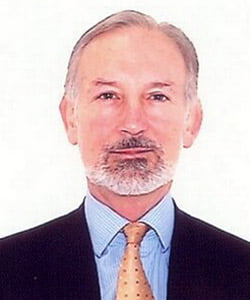
Gilbert Doctorow studeerde in 1967 magna cum laude af aan Harvard College en behaalde in 1975 een Ph.D. in History van Columbia University.
Hij heeft het grootste deel van zijn professionele carriere in corporate business gewerkt; eerst als marketing manager in verschillende Centraal Europese landen en uiteindelijk als general manager in Moskou en St Petersburg tijdens de jaren negentig voor topproducenten van luxeproducten. De afgelopen vijftien jaar heeft hij vier boeken geschreven over de Amerika-Europa-Rusland betrekkingen.
De essays in dit boek gaan over grote politieke, sociale en culturele gebeurtenissen vooral in Europa en Rusland in de periode 2017 – 2019 waarbij Doctorow zelf deelnemer of ooggetuige is geweest en waarvan hij zijn indrukken deelt.
Een aantal essays zijn reisverslagen, lezingen en recensies van interessante boeken over belangrijke onderwerpen als immigratie, liberalisme en oorlog met Rusland. Onderwerpen, die niet de brede publieke aandacht hebben gekregen die ze verdienden.
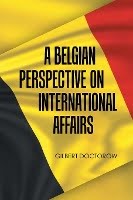
Het boek is te verkrijgen bij Authorhouse in hardcopy of e-book
Het laatste werk van Doctorow is te vinden op zijn webpagina
Ter verdere introductie van Doctorow en het boek plaatsen we hieronder integraal zijn introductierede tijdens de presentatie van het boek in de Pers Club Brussel op 28 januari 2020.
” Excellency, Members of the European Parliament, distinguished guests, friends. Thank you for coming this evening!
My name is Gilbert Doctorow and I am the author of the book being presented, A Belgian Perspective on International Affairs. I will say a few words about myself in a moment. But first I want to introduce my co-presenter, ambassador Michel Carlier. Over the course of a full career in the Belgian diplomatic service, he held posts of increasing responsibility at Belgian embassies in more than a dozen countries, including Poland and Hungary. Hence, his particular interest and qualifications to speak about this book.
Tonight’s presentation will be bilingual. I will continue in English. Ambassador Carlier will deliver his talk in French. When we move on to take questions, you may ask them in either language.
Anyone who has leafed through my latest book will find there is no “about the author” page, and you may well wonder who I am. As regards the title of the book, it is highly relevant to know that I am a Belgian, a naturalized Belgian of two and a half year’s standing, as well as an American. I am also a Russian expert by education and by life experience in international business. From 1994 to 2002, I lived and worked in Moscow and St Petersburg, most of that time as country general manager for several multinational corporations in the consumer goods and services sectors.
Being a Russian expert has had its hemline issues of popularity waning and waxing. As from the end of the Cold War in 1989, demand for this profession was on a steep decline. Following 9/11 that decline seemed to be terminal given the shift of attention by intelligence services, by the military and by the general public to the Middle East – Farsi and Arabic affairs. The heightened tensions with Russia ever since 2007 have marked a steep increase in demand for Russia expertise, pushed still further in 2014 by Russian actions in Crimea and Eastern Ukraine. In the electoral year 2016 I became the darling of domestic Russian state and commercial television for whatever insights I could offer on Mr. Trump. I wrote about my insider’s experience of Russian media in my previous collection of essays, Does the United States Have a Future? and again it appears in updated form in the latest collection, in a long essay written in French that was originally a public lecture I delivered here in Brussels last fall.
In the past couple of weeks I have re-emerged on Russian television and in global media as an analyst and interpreter of Mr. Putin’s constitutional reforms and of his new cabinet of ministers.
Now let me say a few words about my latest book, A Belgian Perspective on International Affairs.
If you go to Amazon.com or bol.com or fnac.com and look up my book you will find the following summary of what it is about:
“The essays in this book deal with major political, social and cultural events primarily in Europe and Russia during the period 2017 – 2019 in which the author was a participant or eyewitness and has personal impressions to share. Several of the essays are drawn from other genres including travel notes, public lectures and reviews of particularly insightful books on key issues of our times like immigration, Liberalism and war with Russia that have not received the broad public exposure they merit.”
Meanwhile if you read the March-April print issue of Foreign Affairs magazine, you will find an advertisement for the same book which reads as follows:
“Essays address the technical and equipment disparities between the United States military and its NATO allies that put in question the soundness of the alliance, the prospects of an emerging arms race, the identification of an ideological dimension which makes the U.S.-Russian confrontation look ever more like a full-blown cold war, the global significance of the Russian-Chinese strategic alignment.”
In that same advertisement, there is a quotation from Jack Matlock, US Ambassador to the Soviet Union, 1987-91 and principal adviser to Ronald Reagan during his summit meetings with Mikhail Gorbachev:
“Doctorow’s essays are a needed corrective to the widespread distortions peddled by much of the mass media in the U.S. and Europe.”
So which of these statements properly characterizes my newest book?
The answer is that they all do.
If you purchase the book today, and I have a few copies here with me, or if you simply use the “Look Inside” button on the book’s Amazon.com page, you will find that the table of contents lists 88 “chapters”, meaning essays, which cover a very broad number of issues. Among the many chapters which are based on personal participation in the events described I would highlight my reports on the March of the Immortal Regiment in St Petersburg, 2018 and 2019 editions – this is the march of family members commemorating their parents and grandparents who fought in WWII or were engaged in the war effort on the home front – it is the civilian dimension of May 9 celebrations throughout Russia. Then there are my Letters from Orlino, describing country life on our dacha 80 km south of Petersburg. Or my report on the 18 March 2018 presidential elections in Russia in my capacity as international observer of those elections in Crimea.
To put it in terms of the publishing industry, my book is a collection of essays and not a monograph.
Monographs are academic, scholarly works investigating a single issue in depth. However, this often means that they spend the first third or more of text on summaries of the past of that issue from time immemorial. How much space is allotted to fresh analysis of the current situation and prognostication of its future development depends on the author-researcher.
Collections of essays are by their nature much less focused, but carry less dead weight. Mine is intended to be thought provoking, to challenge the conventional wisdom on numerous aspects of our present confrontation with Russia by introducing facts, reports that you will not otherwise find in our mainstream print and electronic media. I say this not to claim any particular brilliance or exclusiveness for myself, but to point out the sad state of journalism in our internet age and in an age of high partisanship when the truth is ignored or ridiculed by our politicians for the sake of what is mistakenly believed to be some greater cause.
This evening by way of introduction to my book I call your attention to three of these mental teasers:
- The fractures in Belgian society over relations with Russia – I have in mind the deep contradiction between the positions held by our political classes and high society, in particular French-speaking high society of Brussels, which I have come to know fairly well from the inside
- The relevance of American technological superiority and exclusiveness to the functioning of NATO as an alliance. Here I draw on an unexpected source of professional analysis from the heart of the Belgian military establishment
- My essay on the insights of Lev Tolstoy’s War and Peace as they bear on our present situation vis-à-vis Russia
My two long essays in this book sharing my impressions as a participant in gala Russian Christmas themed dinners at one of the top French speaking gentlemen’s clubs of Brussels, in 2018 and 2019, are a key justification for my insistence on presenting a Belgian Perspective on International Affairs that is at sharp variance with what you will hear from the Royal Egmont Institute, or for that matter from reading La Libre or Le Soir every day.
General DeGaulle famously presented the rhetorical question: how do you govern a country like France with several hundred varieties of cheese? The same could be said of Belgium and its several hundred beer brands. Therefore it should come as no surprise that on matters of foreign policy and defense policy, Belgians are individualists, they have a great diversity of opinions even if these do not appear in media. In this sense, Belgium stands out against a background of very conformist nations like Germany, most of Scandinavia and, of course, the United States.
The gala dinners were fully subscribed by an enthusiastic and varied guest list from high society that enjoyed immensely the Cossack singers and rounds of vodka passed to the top VIPs to be downed to cries of ‘пей до дна’ – bottoms up’ in Russian. Over cocktails ahead of dinner, at the table and over coffee following dinner I heard sharp criticism of the subservience of Belgium and its fellow Member States of the EU before the American hegemon. At the same time, I assure you that I have found similar views out on the street among work-a-day Belgians.
Not every Belgian federal institution is ruled by self-imposed censorship and has to repeat the party line on US global leadership. One chapter in my book explains how rapid advances in U.S. military technology have put in question the viability of the NATO alliance. This material comes not from my own observations – since I am just a layman in military matters. It comes from a Belgian expert in the armed forces and was published in the journal of the Royal Higher Institute of Defense. Unless the European members of NATO buy American, as for example the F35, with its unique and exclusive communications gear, they could become collateral damage in any joint mission. This logic condemns the European defense industry to extinction. And in the meantime Europe is viewed in the Pentagon as just a spare tool kit, not a full-blooded allied force. Read this and get ready for a shock.
Finally, let me share a word with you about my chapter on the relevance of Leo Tolstoy’s novel War and Peace to our present-day confrontation with Russia.
This is the second Tolstoy novel that I have analyzed for readers to highlight views that could have been written in our own day, not 140 years ago, as they are timeless and insightful.
The first novel I dealt with was Anna Karenina, which I presented in my last collection of essays, directing attention to the final quarter of the novel, which should perplex readers because it continues the narration following the suicide death of the heroine, when nearly all novels normally would end. In these pages Tolstoy recorded how society had been swept up by Pan Slav feelings and bellicosity which prompted a large contingent of volunteers to go off and join the Balkan wars and eventually got the state embroiled in a war with Turkey that the country won militarily but lost diplomatically at the peace conference. Tolstoy describes the way enthusiasm for the cause was fanned by the editors and their newspapers of the day which all quacked in unison like so many frogs. Does this sound familiar? That particular essay had a successful run on the internet and I received a very complimentary letter from a Russian literature professor at Brown University in the US for extracting what is usually ignored in the classroom.
My new essay on War and Peace similarly brought out an element in Tolstoy that is generally passed over by those who enjoy the author’s romantic and tragic story of Natasha and Prince Andrei to the exclusion of so much else. What they tend to overlook is the philosophical musings of the author about great men – Napoleon and Alexander – about the forces of history, about free will and determinism. These thoughts are all brought together in the Second Epilogue, about 75 pages long, which publishers sometimes omit precisely because it is a message from the author directly to the readers and not coming through his characters.
What you find when you look at these philosophical observations of Tolstoy is his grappling with the fact that the whole of Europe was marching East against Russia, not just France. Marching east to spread its revolutionary ideology in what they construed as the heartland of autocratic Asia but also to rob and pillage. It does not take too much imagination to see in Napoleon’s Grande Armée the present day forces of NATO or to understand the hazards of underestimating Russian determination, strategic depth and innovative solutions in devising asymmetric defenses that overwhelm their foes.
This particular essay has also had a very successful international run. It was translated into several European languages.
With that I end my brief introduction to my book. I turn the microphone over to Ambassador Carlier. “
